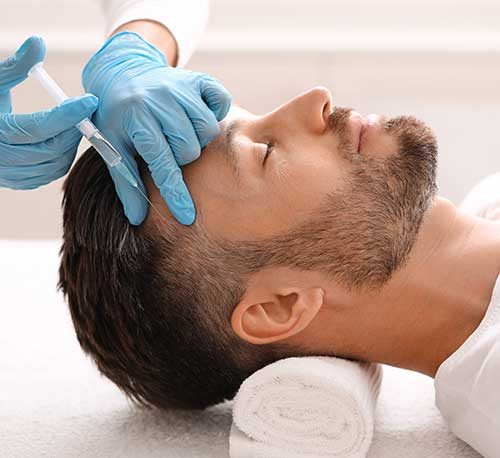Hair loss is a complex issue that can stem from a range of factors, including genetics, diet, stress, and environmental influences. Holistic hair loss treatment takes a comprehensive approach, focusing on underlying health, lifestyle adjustments, and natural remedies to promote healthier, stronger hair. Let’s dive into some effective holistic treatments for hair loss that go beyond the scalp to nourish the entire body.

Understanding Holistic Hair Loss Treatment
Holistic treatments aim to treat the root cause of hair loss rather than just the symptoms. This approach recognizes that hair health is connected to the body’s overall wellness, meaning that when we take care of our physical, mental, and emotional health, our hair benefits as well. Holistic treatments often integrate natural remedies, nutrition, stress management, and lifestyle adjustments to support hair regrowth and prevent further loss.
Key Holistic Treatments for Hair Loss
- Nutrition for Hair Health
- Balanced Diet: A diet rich in vitamins, minerals, and proteins is essential for healthy hair. Key nutrients include biotin, vitamin D, zinc, iron, and omega-3 fatty acids, all of which are crucial for hair strength and growth.
- Superfoods: Incorporate hair-friendly superfoods like spinach, sweet potatoes, chia seeds, walnuts, and salmon. These foods are packed with antioxidants, vitamins, and minerals that strengthen hair from within.
- Hydration: Staying hydrated helps keep hair follicles nourished, preventing dryness and brittleness.
- Herbal Supplements and Natural Remedies
- Saw Palmetto: This herb is known to help reduce levels of DHT (dihydrotestosterone), a hormone linked to hair loss, particularly in men.
- Aloe Vera: Aloe vera gel can be applied directly to the scalp to soothe inflammation, reduce dandruff, and promote hair growth. It’s also gentle on sensitive skin.
- Essential Oils: Massaging essential oils like rosemary, peppermint, and lavender into the scalp may stimulate blood flow to hair follicles. Always dilute with a carrier oil like coconut or jojoba oil to avoid irritation.
- Green Tea Extract: Green tea contains polyphenols that may promote hair growth by reducing DHT levels and inflammation.
- Stress Management Techniques
Stress is a well-known factor in hair loss, as it can push hair follicles into a resting phase, leading to thinning and shedding. Managing stress can be transformative for hair health.
- Mindfulness Meditation: Practicing mindfulness helps lower stress hormones, which can positively affect hair growth.
- Yoga and Exercise: Regular physical activity reduces cortisol levels and increases circulation, bringing more nutrients and oxygen to the scalp.
- Deep Breathing Exercises: Techniques like diaphragmatic breathing and progressive muscle relaxation help reduce stress and can be integrated easily into your day.
- Acupuncture and Scalp Massage
- Acupuncture: Practiced in Traditional Chinese Medicine (TCM), acupuncture is believed to stimulate blood flow to the scalp and improve energy (Qi) balance in the body. Some individuals have found acupuncture beneficial for stress-related hair loss.
- Scalp Massage: Massaging the scalp with oils not only promotes relaxation but can also improve blood circulation, helping stimulate hair follicles. Use gentle, circular motions with your fingertips for the best results.
- Detoxification and Elimination of Toxins
Environmental pollutants, toxins, and even heavy metals can accumulate in the body, potentially affecting hair health. Detoxification helps eliminate these harmful substances and supports healthy hair growth.
- Reduce Toxin Exposure: Limit exposure to harsh chemicals in hair products, household cleaners, and even certain foods. Switch to natural, sulfate-free, and paraben-free shampoos and conditioners.
- Herbal Teas and Detoxifying Foods: Include herbal teas like dandelion root, nettle, and ginger to aid liver function and detoxification. Foods like leafy greens, beets, and turmeric are also beneficial.
- Infrared Sauna: Sauna therapy, particularly infrared saunas, may help eliminate toxins through sweat and improve overall circulation, indirectly supporting hair health.
- Hormonal Balance and Lifestyle Adjustments
Hormonal imbalances, especially those related to thyroid health, estrogen, or testosterone, can contribute to hair loss.
- Check Hormone Levels: Consult with a healthcare provider to assess hormone levels and rule out imbalances as a cause of hair loss. This might include checking thyroid function and testosterone levels.
- Natural Hormone Balancers: Adaptogenic herbs like ashwagandha and maca root can help balance cortisol levels, while evening primrose oil may support hormonal health in women.
- Sleep Hygiene: Aim for 7–8 hours of quality sleep each night to allow the body to restore and repair, which includes hair cell regeneration.
- Holistic Hair Care Routine
- Gentle Hair Washing: Over-washing strips the scalp of natural oils, while under-washing can clog follicles with product buildup. Find a balance, washing 2–3 times per week using natural shampoos.
- Avoiding Heat and Chemical Treatments: Excessive heat styling, dyeing, and chemical treatments can weaken hair strands and worsen hair loss. Choose minimal styling, and air dry hair when possible.
- Regular Trimming and Scalp Exfoliation: Regular trims prevent split ends, and scalp exfoliation helps clear dead skin and buildup, allowing hair to grow freely.
Benefits of a Holistic Approach to Hair Loss
Holistic hair loss treatment doesn’t provide overnight results but supports sustainable hair health by focusing on the underlying causes of hair loss. By addressing factors like stress, nutrition, and toxin elimination, a holistic approach can lead to:
- Improved scalp health and hair follicle strength
- Reduced inflammation and better hormonal balance
- Enhanced overall well-being, which contributes to long-term hair health
Final Thoughts
Hair health is deeply connected to the body’s overall balance, and holistic hair loss treatment takes a comprehensive, natural approach to restoring this balance. By addressing the root causes of hair loss through diet, stress management, detoxification, and natural hair care practices, you can improve hair health from the inside out.
If hair loss persists, consider consulting a holistic health practitioner, dermatologist, or trichologist to develop a personalized plan that aligns with your specific needs. While regaining hair can be a gradual process, a holistic approach nurtures not only your hair but also your entire well-being.